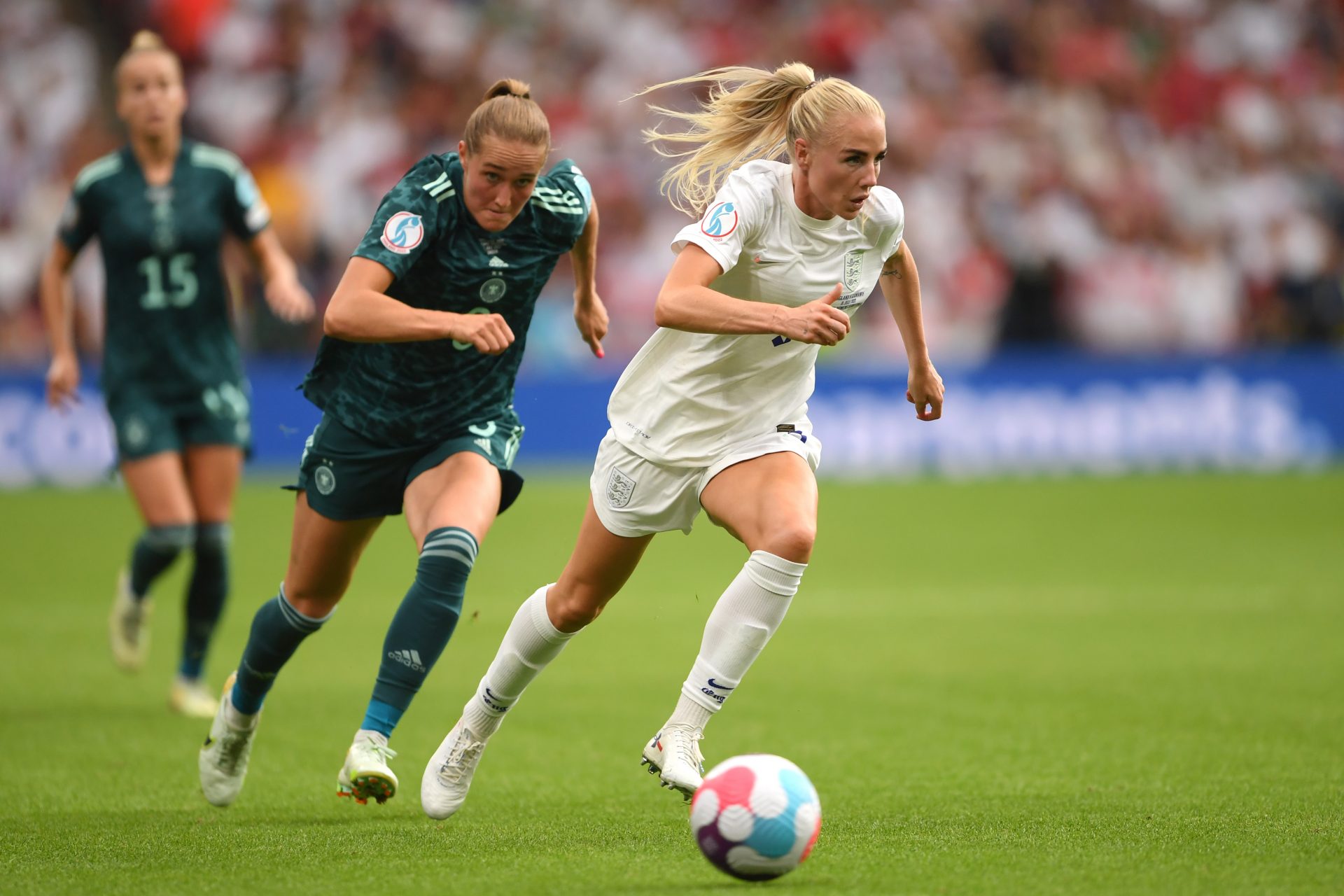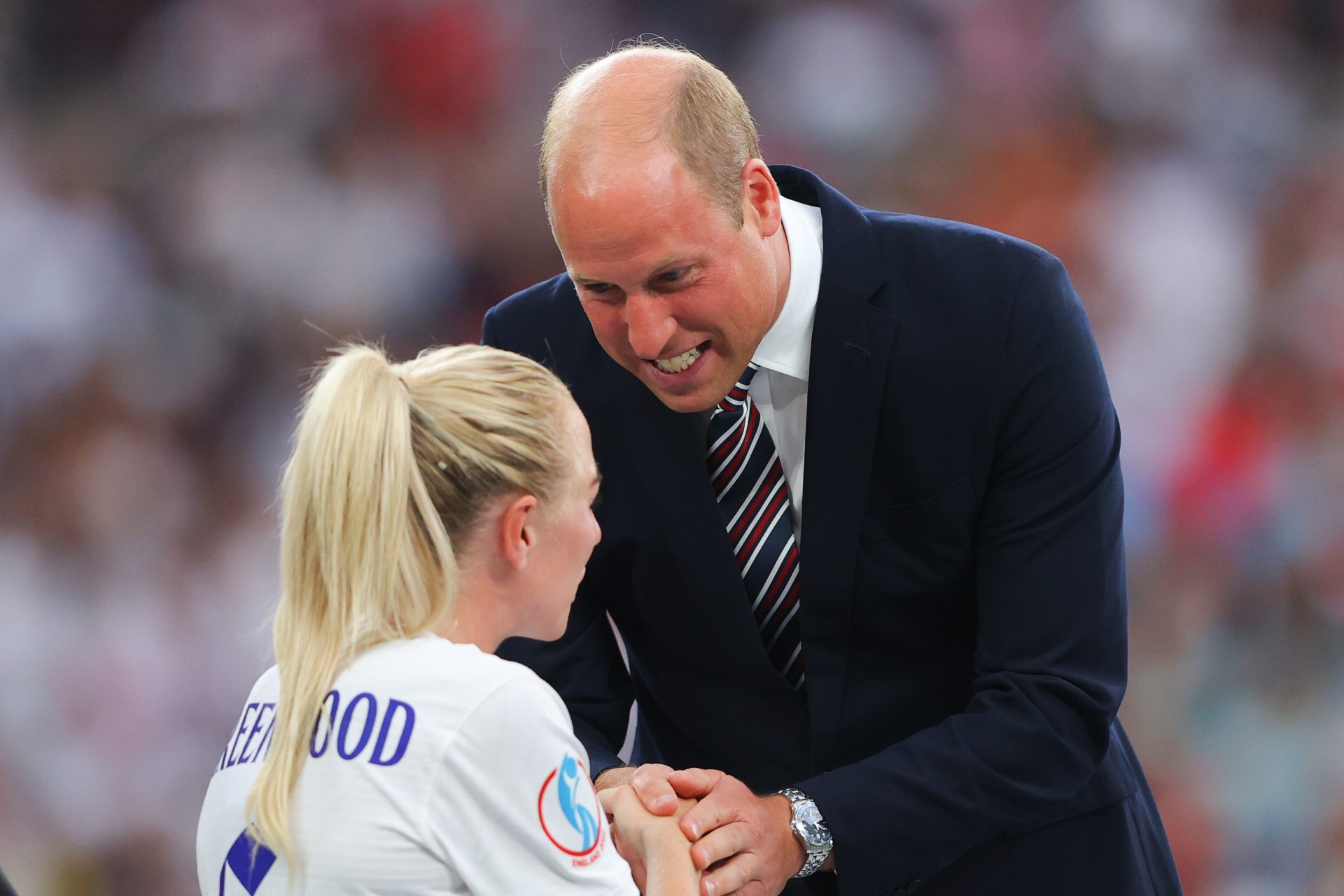Written by Deborah Linton
Following their record record-breaking success at the Women’s Euros 2022, Lioness Alex Greenwood explains why the work has just begun when it comes to raising the profile of women’s sport
Alex Greenwood – footballer, Lioness and, as of this summer, European champion – is looking forward. Sliding into view on a zoom call from her club, Manchester City’s training ground, Greenwood is fresh from a photo shoot in next season’s kit and is palpably excited about what lies ahead.
This will be a season like no other for the women’s game, after Greenwood, 28, and her England teammates sent euphoria rippling through the nation when they beat Germany 2-1, making history to lift the Women’s Euro trophy in front of a sold-out Wembley stadium – and 17 million more at home – little over a fortnight ago.
The Liverpool-born ‘super substitute’ – so-called because she was brought on at game-changing moments through the tournament, not least as the final edged towards extra time – became as identifiable to new fans for her defending as she did for the unselfconscious glamour she brought to the pitch, looking as pristine today post-photoshoot as she did when she walked out in the final.
After just enough time for “a mental switch off”, she’s back at work, preparing for a new season with Manchester City, England’s final qualifying matches – in a fortnight – for next summer’s World Cup and a sell-out friendly clash between England and the USA, current world champions, at Wembley, in October. The interest in women’s football has shifted immeasurably – and she can feel it. “It’s so exciting,” she says. “When I get a moment to myself, to actually go through all the social media messages, which just wasn’t possible after the final, it’s people saying thank you for what we’ve done as a team, for what we could have done for the future. That is so rewarding.”
Like her teammates, she is adjusting to millions more people knowing her name too. “It’s a big change being recognised in places where I wouldn’t have been before,” she says of doing the supermarket shop or going out for food. “We might have been noticed by fans of the game before but not on this scale.”
The ‘we’ refers to her and long-term boyfriend, Sheffield United footballer Jack O’Connell. The pair met at school, in Bootle, Liverpool – Greenwood has her hometown map coordinates stitched onto her Under Armour boots – when both were on the path to turning professional. When they walked onto the pitch at Sheffield’s Bramall Lane, together, the week after the Euros, Greenwood – dressed in an oversized beige blazer, cropped T-shirt and loose-fit jeans, her winner’s medal around her neck – was met with the kind of applause reserved for sporting legends.

After the final, ticket sales for the Women’s Super League (WSL, the Premier League equivalent) rocketed. At Manchester City, where Greenwood is one of seven Euro Lionesses in the squad – including Chloe Kelly, who became an overnight icon when she scored the winning goal and celebrated in her sports bra – sales doubled overnight. It means a new era on and off the pitch for Greenwood when the season starts next month. She can’t wait.
“The biggest thing for me is that even in teams who didn’t have players representing them at the Euros, attendances are going up. It’s amazing,” she says. “But it also needs to be sustainable, normal. We don’t want it to be breaking news every time it happens.”
This is where Greenwood, and her teammates’, real post-Euro mission comes in. Less than 24 hours after their win, on the team bus to their Trafalgar Square celebrations, the 23 Lionesses agreed to sign and share an open letter, on Twitter, asking the government to use their victory for change. They wrote: “We want every young girl in the nation to be able to play football at school.”
Greenwood wants the option to participate in sport to be ‘non-negotiable’ for girls. She explains: “We want our message to have longevity. It’s about a change in society – and for women in general. Be it football or hockey, whatever it is, we want young females to feel that sport is a space for them to enjoy themselves. It doesn’t have to be at a competitive level, either. If it’s just to make friends or have fun or feel healthy, as women, it’s so important we send that message.”
Greenwood describes football as her first love. She was a street footballer, playing with older kids – who, she’s said, we’re often bullies – outside her nan’s house and joining her uncle’s boys’ team at weekends. She was scouted for Everton’s girls team, aged just six, and was representing England before she left high school.
That resilience stood her in good stead for football’s uglier side. Online trolling from rival fans has become distressingly normalised and Greenwood has spoken out about how threats and atrocious abuse – insults like ‘proper football slag’ and ‘human trash’ – ‘wrecked’ her for a time.
“As a footballer, you become accustomed to receiving those messages and I don’t think that’s OK,” she explains. “It’s not a male and female footballer thing either, men go through a hell of a lot too. We’re all in this, fighting online abuse, together. My message is to stick to your principles and who you are. I’m a big believer in that.”
Indeed, Greenwood has always had the fortitude to be herself which has at times included having to defend her appearance, sadly. During the 2019 World Cup, she recalls coming away from matches to messages from people who couldn’t get used to seeing a woman wearing false lashes on the pitch. “They’d say things like, ‘football match at five and night out at nine,’” she says. “You learn to become thick-skinned. I’d be lying if I said you didn’t read them and go ‘that’s not nice’ but would it make me take my eyelashes off? Absolutely not.”
Those lashes, paired with her newfound platform, make Greenwood a beauty brand’s dream, sure. But this isn’t a superficial point. It speaks to one of the most powerful messages to come out of the Euros: the freedom and joy that women can find in being exactly who they are, within a team and through sport.
“You have to be unselfconscious on the pitch,” says Greenwood. “I’m around powerful women every single day and I think, to feel yourself, almost makes you play better. And everybody feels comfortable in different ways. If that’s having their eyebrows done, wearing makeup or, for someone like myself, wearing eyelashes, you should do it. It’s something I wear away from football so why shouldn’t I wear it on the pitch too? I want a little girl who looks up to me to feel comfortable knowing she can do both.”
Greenwood is challenging society’s expectations of sportswomen in other ways too. When Nike brought out England’s all-white kit, earlier this year, she was among the Lionesses who raised concerns about wearing it on their periods. And it matters; research (from charity, Women in Sport) shows that girls drop out of exercise when they go through puberty, feeling more ‘on show.’

“We need to get to a place where we have women’s kits that work better for females, including considering menstrual cycles,” she says. “Women don’t want to pull on white shorts and worry about whether things are going to look the same after 90 minutes. That is not something you should be bothered about during a game.
“A young player, at 18, might not know who to speak to or feel shy. But it’s time to have those conversations, now, after the success we’ve had.”
Greenwood takes her responsibility to the next generation seriously. As a girl, she looked up to male footballers – Steven Gerrard and Jamie Carragher – but was lucky to have role models, in the women’s game, too – Fara Williams and Jill Scott, who is still among her England teammates.
Like many of the current Lionesses, those women – Williams, Scott – and many others paid to play the game they loved, worked other jobs so they could afford to pursue football, before professional contracts were widely available. The FA only lifted a 50-year ban on women playing, in 1971, and the WSL, which launched in 2011, only turned fully professional in 2018, bringing higher standards of provision and wages with it, although they are still a long way from the men’s game. Goalkeeper Mary Earps worked multiple jobs, including at a cinema, a toy shop and in telesales, just to pay for her boots and petrol for games, while striker Beth England was working night shifts in a chippy only six years ago.
“I was fortunate,” says Greenwood. “I had to get an education, which I think is so important, but I came into the game (to a club, Everton) as it turned professional, so I didn’t have to go out and work. I had very supportive parents who worked every hour under the sun to make sure I could attend football. But I’ve seen the women who came before me, who worked in the morning then came to training in the evening. They were tired but there was never a complaint, it was just ‘crack on’ because they loved the game. They’re as much a part of our Euros success as we are.”
Unlike most of the women before her, Greenwood now finds herself a household name. This week, she walked out onto the pitch, for City’s Champions League qualifier match, in Madrid, both as club captain and as a role model, razor focused on her part in helping transform the way women feel about sport. “I grew up around a lot of women, including my mum, who always told me to be myself and their belief in me made me feel confident,” she says. “I want to do that for other girls and women, too. It’s so important to be comfortable in who you are.”
Images: Getty
Source: Read Full Article